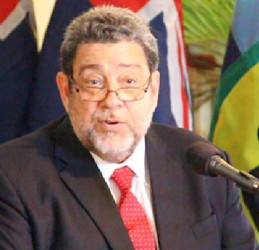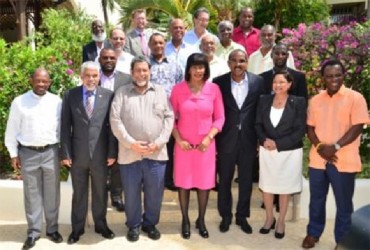By Dr Ralph E. Gonsalves (edited version)
The current status of CARICOM can be characterized by the twin and dialectically-connected processes of consolidation and progress within the terms of CARICOM’s design as crafted in the Revised Treaty of Chaguaramas of July 2001 and the subsequent decisions of the Conference of Heads and of other Treaty institutions.
It is always important to remind everyone that CARICOM is a community of sovereign states cobbled together by a creative “inter-governmentalism” and not a “supra-nationalism”. In the entire CARICOM architecture, only the Caribbean Court of Justice (CCJ), in its original, compulsory and exclusive jurisdiction, as the guardian of the Revised Treaty, and the enforcer of community law, is a supra-national entity clothed with authority to hold the governments to account and to compel obedience. CARICOM is not a unitary state, not a federation, and not even a confederation. Thus, as a community of sovereign states, it constantly gropes for consensus, without a central executive mechanism and a legislative machinery like in the European Union. This is why it is left to the supra-national CCJ to correct any implementation deficit within the scope of its jurisdiction as it has done in the Trinidad Cement and Shanique Myrie cases. Still, we cannot expect the CCJ to perform miracles and fill the administrative, executive, and policy lacunae evident in the Revised Treaty. That is the fundamental business of the political directorate in the regional integration enterprise – this is our business.

Despite the design limitations of CARICOM, its possibilities have borne fruit, even if unevenly, in its four articulated pillars of coordinated activities: functional cooperation; economic integration, including trade; the coordination of foreign policy; and the combining of regional security initiatives. In each of these areas, much progress has been made over the past 41 years of CARICOM’s existence, and especially so since the Revised Treaty some 13 years ago. Still, there is much work to be done.
Over the past six months of my Chairmanship of CARICOM, consolidation and advance have been evident on several items of integration including: the freedom of movement of persons, especially since the Myrie judgment in October 2013; the continued utilisation by the private sector in CARICOM of “the right of establishment” so as to facilitate enhanced regional investment, job and wealth creation; the relatively smooth working of “the free trade”, “customs union”, tariff and non-tariff arrangements, and payment systems in the single market; the improved coordination of the regional security apparatuses and between them and other friendly nations who have vested interests in our Region and hemisphere in fighting crime; the continued coordination of foreign policy, despite some hiccups or a few episodes of dissonance; and the on-going progress being made on a swathe of functional integration subjects such as health, education, culture, sports, elderly, women, the youth, persons with disabilities, and social security.
During the past six months too, it has been my pleasure to see Barbados chosen as the locale for the global launch of World Environment Day; pleased to be a witness to the immense national, regional and international achievements of several CARICOM Member States in diverse areas including scientific research, education, tourism and other productive endeavours, sports and culture, and diplomacy. It has been my pleasure too to celebrate quietly – noisily in some cases – the splendid achievements of numerous individual CARICOM citizens and friends, and to watch and participate with countless pilgrims at prayers in joyful gratitude and heartfelt thanks to Almighty God for the bountiful blessings he has granted us in our Region and for the amazing grace which he offers us always to lead us safely home. To those who say we have nothing to appreciate, that’s quite a long list.
The absence of a dramatic forward-movement in CARICOM’s affairs ought not to invite unwarranted criticism or a paralysing cynicism. Neither must we fall prey to a smug satisfaction about consolidation and progress in the face of foot-dragging in some critical issues and an unacceptable implementation deficit on items upon which we have solemnly agreed.
Deeper integration, beyond a single market and functional cooperation, among countries which are predominantly resourced-challenged islands, faces obstacles not encountered by resource-rich nations in an economic union on a continental landmass. Islandness naturally produces an outward gaze, enlarged by globalisation; but it engenders, too, an intense inward look which the very external pressures mistakenly magnify, among some citizens, an illusory localism or parochialism as a strategic option. Further, given the profound resource limitations of most Member States of CARICOM, and the unevenness of their resource-endowments and socio-economic development, the challenges attendant upon a deeper integration push are exacerbated. An on-going economic slow-down worsens, on the ground, the condition for a deeper union.

Yet, it is our very smallness, our islandness, our scarcity of resources, and the global economic down-turn which necessitate a greater cooperative, integration effort. So despite the challenges and the difficulties, these limitations, in concert with our extant possibilities as largely middle-income developing countries, ought more assuredly to prompt us to move faster towards a single economy and improved regional governance. In this venture, political leadership is vital; our doubts must no longer detain us; and we must ever more love and care for CARICOM, for without it, despite its many false starts and disappointments, our people would be diminished in their quest to enhance, in their own interest, their capacity to address, most optimally, the internal and exogenous challenges which beset them. In all these reflections, we must never forget CARICOM’s accomplishments which constitute a part of the permanent landscape of our Region’s political economy.
Mr Chairman, colleagues, many important items for the on-going CARICOM agenda are up for further consideration at this Conference of Heads of State and Government. They include: Consideration and Approval of the Strategic Plan for CARICOM 2015-2019; the Report of the Commission on the Economy; the imminent coordination of CARICOM’s policies on climate change and the post-2015 development agenda as they affect Small Island Developing States (SIDS); an update on the trade negotiations with Canada; the approval of the draft Terms of Reference and composition of the Regional Commission on marijuana; the advancing of the historic quest of Reparations for Native Genocide and Slavery; the review of the Draft Protocol for a special Carve-Out for the OECS in the context of the Revised Treaty of Chaguaramas; the Report of the Transport Commission; the consideration and approval of the terms of reference of the Commission on Human Resource Development; the Pan-Caribbean Partnership against HIV/AIDS; and a miscellany of other areas of functional cooperation. So you notice we have quite a handful to be doing over the next few days.
Mr Chairman, Colleagues, Ladies and Gentlemen, one vital issue touching and concerning human rights in our Region which must be kept on the front-burner of CARICOM concerns the unacceptable denial of citizenship to persons of Haitian descent born in the Dominican Republic. The basic facts that have sparked the justifiable regional and international outrage on this matter are well known and need no elaboration here. In late 2013, the CARICOM Bureau took a strong stance in demanding an appropriate corrective from the government of the Dominican Republic and laid out “a no-business-as-usual” position in CARICOM’s relations with the Dominican Republic. The Bureau’s stance was re-affirmed at the Inter-Sessional Meeting of the Conference of Heads of CARICOM in St. Vincent and the Grenadines in March 2014.
Since then, the long-awaited reform law on “nationalisation” was enacted by the competent authorities in the Dominican Republic. This law has been rightly condemned regionally and globally as a not-so-clever smokescreen to con the unsuspecting that a real reform has taken place. In reality, this so-called reform law covers only a minuscule proportion of those persons of Haitian descent who were arbitrarily denationalised, hitherto.
I urge my colleagues not to wobble on this issue and remain firm. It would be wrong to cave in to this unworthy sleight of hand by the authorities in the Dominican Republic. The persons of Haitian descent born in the Dominican Republic, who have had their human rights abrogated or denied, deserve CARICOM’S continued support. And it still cannot be business-as-usual with the Dominican Republic.
As we convene for this Conference of Heads of Government, we must admit that there is genuine material hardship among huge sections of the Region’s population as a consequence of the global economic meltdown of September 2008 and continuing, the severe impact of several natural disasters, the still unresolved debacle of the collapse of BAICO and CLICO especially in the OECS member-states, the capital and liquidity challenges of many indigenous banks, the enormous fiscal overhang and correspondingly unsustainable debt-to-GDP ratios in most CARICOM countries. We have to watch the truth in its face and come to terms with it.
Undoubtedly, this economic and fiscal conundrum demands continued urgent corrective action nationally, and regionally. The conversation on these matters is at the top of the agenda at this summit; national solutions are at best partial; and a concerted regional approach is required to improve our economies, create wealth and jobs, and manage much better our fiscal and debt condition, and strengthen the social safety net for those who are disadvantaged. The task ahead is not easy; but we must keep our focus accordingly. We have survived and thrived and gotten over far worst challenges. Our parents and grandparents have done so. Why are we worried about this, we must not be fearful. We must face the challenges squarely and honestly.
Civil society, including businesses and trade unions must appreciate the continuing difficulties and act responsibly. There is no magic wand; hard, smart, and productive work has to be the preferred option over profligacy, leisure, pleasure and nice-time. All hands are required to be on deck. Facile solutions are but mirages. We must dig deep into the recesses of our Caribbean civilisation to summon all that which good and sensible in us, as we go forward.
I take heart thus from the wisdom of the Book of Ecclesiastes:
“He that observeth the wind will not sow; and he that regardeth the clouds will not reap ——In the morning sow thy seed and in the evening withhold not thy hand; for thou knowest not which shall prosper, whether this or that, or whether they both shall be alike good.”
As I close, I thank on behalf of the Community, the Secretary-General and the CARICOM Secretariat for their continued productive labours and devotion to duty in challenging circumstances and difficult times. It gives me great pleasure to pass the baton of chairmanship to my dear brother, Gaston, of Antigua and Barbuda, our dear Prime Minister.
Thank you very much!









